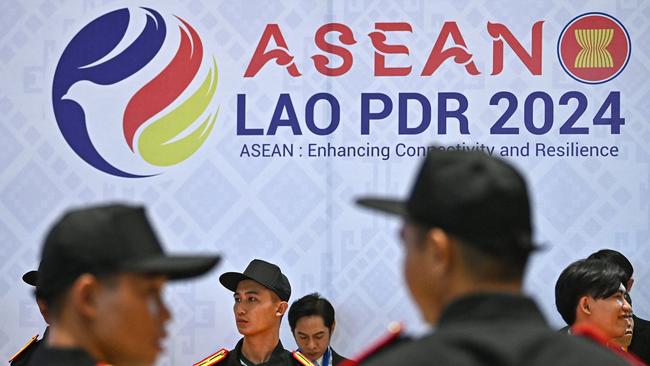Anthony Albanese to confront Chinese Premier at ASEAN summit
Anthony Albanese is expected to confront Chinese Premier Li Qiang over Beijing’s maritime aggression and lobster import bans at the summit in Laos.

Anthony Albanese is expected to confront Chinese Premier Li Qiang over Beijing’s maritime aggression towards its neighbours including the Philippines, as deliberations over a code of conduct for the South China Sea continue at the ASEAN summit in Laos this week.
The Prime Minister is also likely to raise China’s ongoing import bans on Australian lobster, one of the final products still subject to Beijing’s trade sanctions.
The summit, which is taking place against the backdrop of the ongoing conflict in the Middle East, will be attended by a number of high-ranking leaders, including US Secretary of State Antony Blinken, Indian President Narendra Modi, new Japanese Prime Minister Shigeru Ishiba and Russian Foreign Minister Sergey Lavrov.
A non-political official from Myanmar will also be attending for the first time since the country’s coup in 2021, while Mr Albanese is due for his first meeting with the Thai and Japanese leaders since their respective elections this year.
The Middle East conflict is expected to feature heavily on the agenda, given the high Muslim populations of ASEAN member countries such as Indonesia and Malaysia, as are the recent spats between China and other nations in the region over disputed territory in the South China Sea.
Despite Philippines President Ferdinand “Bongbong’” Marcos warning in June that the harming of a Filipino during an instance of Beijing’s maritime aggression would be considered an act of war, China on Wednesday undertook another incursion into disputed territory, firing high-powered water cannons at Filipino vessels.
No one was reported to have been hurt during the exercise.
Mr Albanese on Wednesday likened the ongoing discussions he was having with China over strategic competition in the region with the dialogue that took place between the US and Soviet Union during the Cold War, declaring open channels of communication were key.
“(The discussion with China) will be constructive and deliberate. We have been … agreeing where we can, co-operating where we can and disagreeing where we must,” he told Sky News. “Where we disagree we communicate that very directly.”
While Mr Albanese does not have a bilateral meeting with Mr Marcos planned, the Philippines’ President was in Australia earlier this year when he gave an address on the floor of parliament.
ASEAN has been negotiating a South China Sea code-of-conduct agreement for several years without yet managing to land a consensus, and a deal is not likely to be landed this week.
Australia’s investment in near neighbours is also due to be raised, with East Timor President Jose Ramos-Horta admitting at the National Press Club in Canberra on Wednesday his country was leveraging China as part of negotiations with Australia over the prospective $74bn Greater Sunrise offshore gas project in the Timor Sea.
“Leveraging on the Greater Sunrise, yeah, of course,” he said.
“You call it ‘leverage’ but we say we look for partners. You know, if Australia doesn’t feel like it, we can totally understand it but then either we talk with the Chinese or the Kuwaitis.”
Mr Albanese is due to host a business forum during ASEAN, also to be attended by former Macquarie Group chief executive and special envoy for southeast Asia Nicholas Moore.
Lowy Institute South East Asia program director Susannah Payton said while she did not expect “any major breakthrough on Greater Sunrise”, Australia needed to heed East Timor’s warning.
“If it doesn’t strike a deal with Dili on Greater Sunrise soon, the country will run out of money,” she said. “It is not in our interests for East Timor to become a weak or failed state which is why the Albanese government has been prioritising negotiations on Greater Sunrise. Australia cannot force a deal but it needs to show that it has made all possible efforts.”




To join the conversation, please log in. Don't have an account? Register
Join the conversation, you are commenting as Logout